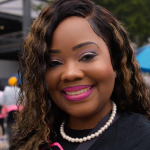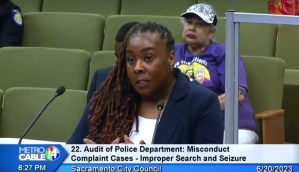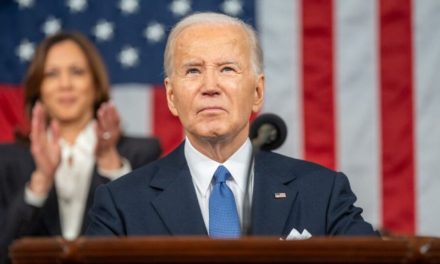By Sym Posey | The Birmingham Times
Toyal McLain has several titles—assistant principal of P.D. Jackson Olin High School; licensed minister at Liberty Baptist Church in Alabaster, Alabama; and owner of McLain Consulting Services, LLC, a consulting business in Hoover, Alabama—but none is more important than breast cancer survivor.
“That’s a title that makes me so overjoyed and brings me to tears,” she said. “December 1 will [mark] nine years that I’ve been cancer-free.”
“Something Is Wrong”
During her school’s Spring Break in 2015, McLain, who was 35 at the time, went for her first ever mammogram.
“My appointment was at 1:30 p.m. at [Brookwood Baptist Medical Center, in Homewood, Alabama], and five hours later they were still evaluating me. My heart and mind said, ‘Something is wrong,’” she recalled.
A week later, McLain said, “My biopsy, [a sample of tissue taken from the body in order to examine it more closely], confirmed that I had triple negative breast cancer [TNBC].”
According to BreastCancer.org, TNBC is an “invasive breast cancer that does not have receptors for the hormone estrogen (called estrogen receptor-negative) … [and] is usually more aggressive, harder to treat, and more likely to come back (recur).”
“[The cancer] was so invasive that it started to spread to my left] arm,” McLain said. “I didn’t feel bad. I wasn’t sick. I went for an annual [examination]. I felt a little something under my arm. I thought maybe it [could be a reaction to] deodorant, [but] I told [the doctor] to check it because my mother had breast cancer twice while I was in high school. [I was told] that the insurance would not cover [the mammogram] because I was too young. They said [it would be covered] only if I was diagnosed with breast cancer.”
Cancer.org, the website of the American Cancer Society, points out that “[TNBC] accounts for about 10 to 15 percent of all breast cancers. These cancers tend to be more common in women younger than age 40 [or] who are Black.”
Furthermore, an article from MedicalNewsToday.com notes, “Black women are more than twice as likely as white women to receive a diagnosis of [TNBC, and] mortality rates for TNBC are also higher among Black women than among white women with the same diagnosis. ”
3 P’s
While waiting at the hospital after her mammogram, McLain said, “From 1 p.m. to 6 p.m. that day, I realized more than ever it was going to take the 3 P’s for handling this life-or-death situation: prayer, prioritizing, and praise. The first P—prayer—had already started.”
She then recalled, “crying, praying, being angry, and crying again,” and her second P—prioritizing—kicked in.
“I got with my doctors and my family and produced a 12-month plan for treatment. I took a leave of absence from work and sat at home to put my health first.
“My support team, [including] my family and church members, all came together to help me in my day-to-day activity,” said McLain, adding that her priority was to “take off work, get my port in, and begin my six months of harsh chemotherapy treatment.”
Within the first months of chemotherapy, she lost every bit of hair on her body. “This was an extremely tough time. I was too weak to get out of bed,” she said. “My husband, [Keith McLain], and [my five] children stepped in to assist me with my health. This was an unfamiliar territory because I had never been sick. I told God, ‘My life is in your hands.’”
While on her breast cancer journey, McLain faced even more adversity: “[After my] six months of chemo was up, my parents’ home caught on fire, my father collapsed from a heart attack in a hotel while their home [in Fairfield, Alabama], was being remodeled, and my mother found a lump in her breast for the third time.”
McLain’s double mastectomy was pushed back until December 2015, after the sudden death of her father in November 2015.
After healing from having both breasts removed and reconstructive surgery, McLain got lymphedema her right arm and hand from having 13 lymph nodes removed. According to WebMD, “Lymphedema is swelling that’s caused by a collection of too much lymph fluid. … Lymph is a protein-rich fluid that moves throughout your body in lymph vessels. ”
“I wear a compression sleeve and a medical glove every single day now,” McLain said.
Family Love
Her final P — praise — came after her surgery, when doctors sent me home with four tubes coming out of my body,” McLain recalled.
“I had to sleep in a chair for two months. My mother had to move in with me. My [three] sisters rotated a schedule with me. I thought to myself, ‘I feel so bad for anyone and everyone affected by this terrible disease.’ It made me appreciate my family, health, looks, abilities, and accomplishments even more. Even though I still had a long way to go before completing this journey, I was grateful for my life,” she said.
McLain endured 26 rounds of radiation over three months and six months of chemo, surgery, and rounds of radiation in total. She began radiation treatments with her mother, Minister Shelia Cunningham.
“[We went to] the same doctor so we could support each other,” McLain said. “[My mother] is a three-time cancer survivor who is still alive and doing well.”
McLain was born and raised in Birmingham and grew up in the Ensley neighborhood. She graduated from Ensley High School and went on to Miles College, where she earned a Bachelor of Arts in Political Science in 2002 and a Bachelor of Science in Social Science and Secondary Education in 2003.
A mother of five, McLain considers her children her “everything.”
She also is a proud member of Delta Sigma Theta Sorority, Incorporated, and has worked for more than 20 years with the Birmingham Board of Education, where she has been named Teacher of the Year twice and has been presented several awards, including the Future Principals Award, Distinguished Teacher Strategies Award, District Leadership Award, Superintendent’s Academy Award, and Birmingham City Schools (BCS) Leads Award.
Today, McLain takes tremendous pride in her journey and often shares her experience with breast cancer.
“I am still on a light form of chemo and must take 12 to 15 vitamins a day to keep my energy up [because] I help run a high school of almost 1,000 people daily,” she said. “I have had my breasts, ovaries, uterus, and gallbladder removed, [in addition to] breast reconstructive surgeries. In all I have had seven surgeries since 2015, but I am still grateful for how far I have come.”
To learn more and how to donate, visit www.breastcancer.org










